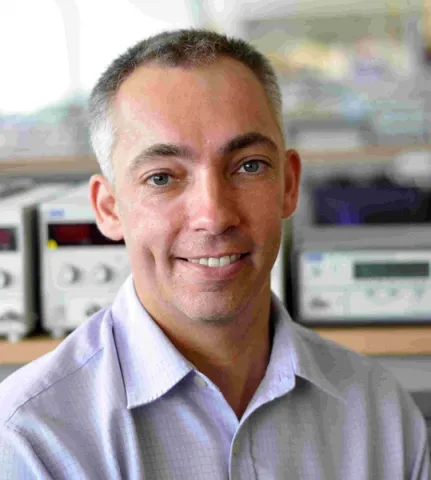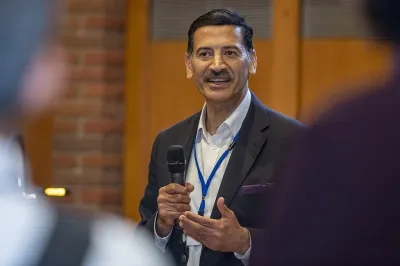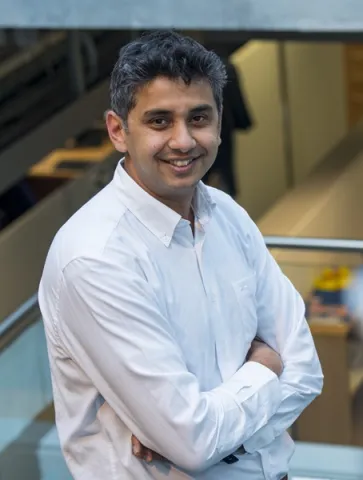Project overview
The focus of this Platform Grant is the combination of wearable systems networked with smart city and building management systems, and the processing of the collected data. The Platform will cover infrastructure and devices and will require innovation in hardware and software in order to realise the goal of a people centred smart city. The topic of the Platform and the underpinning research themes require a multidisciplinary approach that can be provided by the unique expertise of the research group in the Department of Electronics and Computer Science at the University of Southampton.
Applications of the technologies will enable effective collection, communication, and processing of this data that, in turn, will enable applications such as crowdsensing activities or allow, for example, the provisioning of ultra-personalised services for users to enrich their experience as they navigate their environment, and engage in work and leisure. Such a capability would allow them to purchase personalised services (e.g. healthcare, entertainment, fashion), enable participatory sensing initiatives to support smart city applications (e.g. real-time traffic updates, pollution monitoring), or help coordinate evacuations during major disasters. Combining wearable sensors with intelligent building management systems can provide distributed sensing of the environment within the building as well as monitoring user activity and wellbeing in order to improve the effectiveness and efficiency of building services (e.g. heating, and ventilation). Such a capability will also become an important research tool to aid in our understanding of building occupant behaviour.
Key research challenges exist in developing user-friendly ubiquitous energy-constrained wearable systems and interfacing these reliably and securely with external networks. Wearable sensors and devices will place individuals at the centre of the smart city and enable a step change in the level of interaction possible. It is essential to develop robust, agile algorithms and mechanisms that can cope with potential failures that may arise in the sensors and networks. Combining AI with sensors enables intelligent interacting agents that can form multi-agent systems exceptionally capable of solving problems and interpreting information. Such developments will underpin autonomous systems, benefit the burgeoning Internet of Things (IoT) and enable the next generation of smart city applications. A flexible funding Platform underpinning the group in these crucial areas of expertise will enable pioneering work and the pursuit of emerging opportunities.
Applications of the technologies will enable effective collection, communication, and processing of this data that, in turn, will enable applications such as crowdsensing activities or allow, for example, the provisioning of ultra-personalised services for users to enrich their experience as they navigate their environment, and engage in work and leisure. Such a capability would allow them to purchase personalised services (e.g. healthcare, entertainment, fashion), enable participatory sensing initiatives to support smart city applications (e.g. real-time traffic updates, pollution monitoring), or help coordinate evacuations during major disasters. Combining wearable sensors with intelligent building management systems can provide distributed sensing of the environment within the building as well as monitoring user activity and wellbeing in order to improve the effectiveness and efficiency of building services (e.g. heating, and ventilation). Such a capability will also become an important research tool to aid in our understanding of building occupant behaviour.
Key research challenges exist in developing user-friendly ubiquitous energy-constrained wearable systems and interfacing these reliably and securely with external networks. Wearable sensors and devices will place individuals at the centre of the smart city and enable a step change in the level of interaction possible. It is essential to develop robust, agile algorithms and mechanisms that can cope with potential failures that may arise in the sensors and networks. Combining AI with sensors enables intelligent interacting agents that can form multi-agent systems exceptionally capable of solving problems and interpreting information. Such developments will underpin autonomous systems, benefit the burgeoning Internet of Things (IoT) and enable the next generation of smart city applications. A flexible funding Platform underpinning the group in these crucial areas of expertise will enable pioneering work and the pursuit of emerging opportunities.
Staff
Lead researchers
Other researchers
Collaborating research institutes, centres and groups
Research outputs
Sheng Yong, Nicholas, David George Hillier & Stephen Beeby,
2022, Frontiers in Electronics
Type: article
Edward Longman, Mohammed El-Hajjar, Oktay Cetinkaya & Geoff Merrett,
2022, IEEE Network, 36(3), 122-128
Type: article
Sivert T. Sliper, William Wang, Nikos Nikoleris, Alexander Weddell, Anand Savanth, Pranay Prabhat & Geoff Merrett,
2022, IEEE Transactions on Computer-Aided Design of Integrated Circuits and Systems
Type: article
Mahmoud Wagih, Abiodun Komolafe, Alex S. Weddell & Steve Beeby,
2022, IEEE Open Journal of Antennas and Propagation, 3, 398 - 411
Type: article
Junjie Shi & Stephen Beeby,
2022, Smart Materials and Structures, 31(4)
Type: article
Mahmoud Wagih, Geoffrey S. Hilton, Alex S. Weddell & Steve Beeby,
2022, IEEE Internet of Things Journal, 9(7), 5229-5239
Type: article
Mahmoud Wagih, Abiodun Komolafe, Alex S. Weddell & Steve Beeby,
2022
Type: conference





